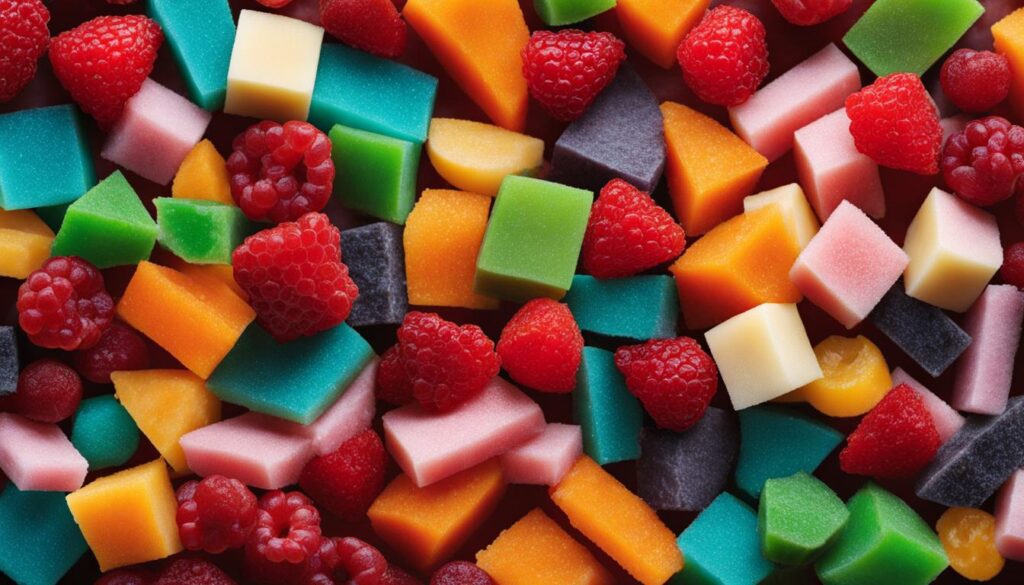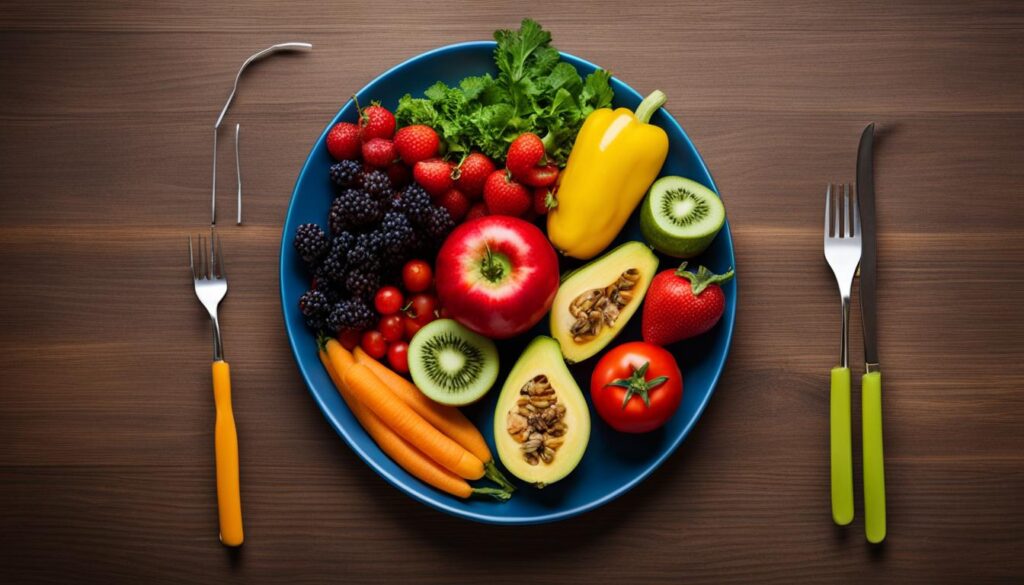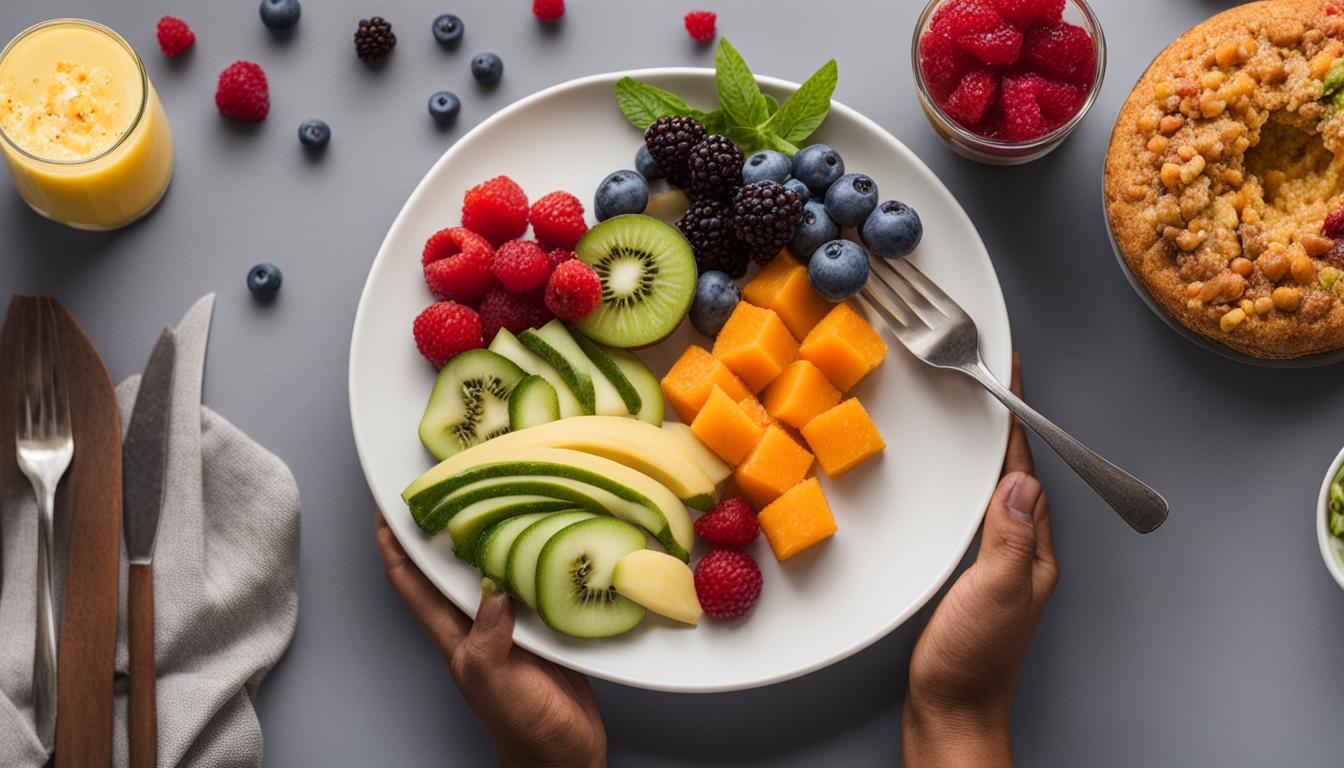Do you find it challenging to resist sugary treats and drinks and end up consuming more sugar than you intended? You’re not alone! Cutting down on sugar can be tough, but it’s essential for maintaining a healthy diet and reducing the risk of health problems such as diabetes and obesity. Luckily, there are simple steps you can take to avoid sugar and embrace a low sugar lifestyle.
Reducing your sugar intake doesn’t have to be complicated or boring. By making a few adjustments to your daily routine and incorporating healthier alternatives, you can still enjoy delicious and nutritious meals without sacrificing taste or satisfaction. To get started, let’s explore some practical tips to help you avoid sugar and improve your overall well-being.
Key Takeaways
- Avoiding sugar in your diet is essential for maintaining a healthy lifestyle and reducing the risk of health issues such as diabetes and obesity.
- By following practical and simple tips, you can successfully avoid sugar and embrace a low sugar lifestyle.
- Reading food labels and finding healthier alternatives are effective ways to avoid sugar.
- Planning your meals and snacks in advance and staying hydrated can help you avoid impulsive sugar cravings.
- Practicing mindful eating and finding healthy ways to combat sugar cravings can support your journey towards a low sugar lifestyle.
Understanding the Impact of Sugar on Your Health
Before we dive into practical tips for avoiding sugar, it’s important to understand how sugar affects your health. Sugar is present in many foods and drinks, including those that are marketed as healthy. Unfortunately, hidden sugars are everywhere and can contribute to a range of health problems.
Sugar in food is not necessarily harmful in moderation, but it’s important to be aware of hidden sugars that can add up quickly. Food manufacturers often add sugar to products such as bread, sauces, and breakfast cereals to enhance the taste, and it’s easy to consume large amounts of sugar without even realizing it.
Consuming too much sugar can lead to a range of health problems, including weight gain, type 2 diabetes, and heart disease. In addition, sugar can be addictive, leading to sugar cravings and sugar addiction.
“Sugar is eight times more addictive than cocaine,” says Dr. Mark Hyman, author of The Blood Sugar Solution.
When you consume sugar, your brain releases dopamine, a neurotransmitter that creates feelings of pleasure and reward. Over time, your brain can become dependent on sugar to release dopamine, leading to sugar cravings and addiction.
Furthermore, sugar consumption can cause a spike in blood sugar levels, followed by a crash, leaving you feeling tired and hungry. This can create a cycle of sugar cravings and overeating, leading to weight gain and other health problems.
By understanding the impact of sugar on your health, you can take steps to reduce your sugar intake and live a healthier, more balanced lifestyle. In the next sections, we’ll explore practical ways to avoid hidden sugars and integrate healthier alternatives into your diet.

Read Food Labels and Ingredients Lists to Avoid Sugar
One of the most effective ways to reduce sugar intake is to read food labels and ingredients lists closely. It’s essential to identify hidden sugars to make informed choices and avoid consuming excess sugar inadvertently.
Most processed foods contain hidden sugars, even if they don’t taste particularly sweet. You can find a list of hidden sugars in food on the NHS website. They can go by many different names, including high-fructose corn syrup, fruit juice concentrate, agave nectar, and dextrose, to name a few.
By reading food labels, you can identify these hidden sugars and make decisions accordingly. Look for products that have a low sugar content or that are sugar-free. You can also find foods that use natural sweeteners, such as stevia, monk fruit, or xylitol. Be aware that some products may be marketed as healthy, but they still contain high levels of sugar.
| Product | Sugar Content per Serving |
|---|---|
| Low-fat yogurt | 14g |
| Granola bar | 12g |
| Muesli | 7g |
| Tomato soup | 6g |
Above is an example of the hidden sugar content in some common food products. By examining the nutrition labels of each item, you can see how the sugar content can add up throughout the day without you realising it.
Reading food labels and ingredients lists may take extra time, but it’s an essential step towards reducing your sugar intake and making healthier choices.
Stock Up on Sugar Alternatives
If you’re looking to reduce your sugar intake, incorporating sugar alternatives into your diet can be an excellent strategy. There are several natural and low-calorie sugar alternatives that can help you achieve a healthier lifestyle without sacrificing sweetness.
Stevia
Stevia is a sugar substitute that comes from the leaves of the Stevia rebaudiana plant. It is a calorie-free, natural sweetener that is up to 300 times sweeter than sugar. Stevia is an excellent alternative to sugar for those looking to lose weight or manage diabetes. You can use stevia in your coffee or tea, or as a substitute for sugar in baking.
Monk Fruit
Monk fruit is another natural sweetener that has gained popularity in recent years. It is derived from the monk fruit plant, which is native to Asia. Monk fruit extract is up to 200 times sweeter than sugar, and it has zero calories. Monk fruit is an ideal sugar substitute for those watching their calorie intake or managing diabetes.
Xylitol
Xylitol is a sugar alcohol that is found in many fruits and vegetables. It is a low-calorie sweetener that has a similar taste to sugar. Xylitol is a great sugar alternative for those looking to avoid sugar’s negative effects on dental health. It is commonly used in chewing gum and oral care products, but it can also be used in baking and cooking.
It’s essential to remember that sugar alternatives are still sweeteners and should be consumed in moderation. While they are generally considered safe, consuming large amounts of sugar alternatives can cause digestive issues in some people.

Another helpful tip is to prepare meals ahead of time. Batch cooking on the weekends allows you to have quick and healthy meals throughout the week, even on busy days. You can also try meal prepping your snacks. For example, you can cut up veggies and store them in the fridge for easy access during the week.
Healthy Sugar-Free Snacks
- Hard-boiled eggs
- Apple slices with almond butter
- Celery with hummus
- Roasted chickpeas
- Trail mix with nuts and seeds (without added sugar)
Planning your meals and snacks in advance can make all the difference in sticking to a healthy, sugar-free diet. By taking the time to plan, you’ll be prepared for any cravings that come your way and have plenty of healthy options to choose from.
Stay Hydrated and Choose Beverages Wisely
When it comes to reducing sugar intake and maintaining healthy eating habits, staying hydrated and choosing the right beverages can make a significant difference. Not only do sugary drinks like soda and fruit juice contribute to excess sugar intake, but they can also lead to dehydration and other negative health effects.
One of the best ways to stay hydrated is to drink plenty of water throughout the day. Aim for at least 8 glasses of water daily, and consider carrying a refillable water bottle with you to help you stay on track.
If you’re looking for a more flavourful option, try herbal tea or infusing your water with fresh fruits like lemon or cucumber. These alternatives can add a touch of sweetness without the added sugar and calories.
Healthy Beverage Options
Here are some healthy beverage options to help you reduce your sugar intake:
| Beverage | Description |
|---|---|
| Water | The most hydrating and sugar-free option. Add a squeeze of lemon or lime for flavour. |
| Herbal tea | A caffeine-free and sugar-free alternative that can help you relax and unwind. |
| Sparkling water | A carbonated and sugar-free alternative to soda. Look for unsweetened varieties that don’t contain artificial sweeteners. |
| Iced tea | A refreshing and low-sugar alternative to sugary soft drinks. Brew your own tea and sweeten with honey or maple syrup if needed. |
| Smoothies | Blend together fresh or frozen fruit, yogurt, and milk for a nutrient-packed and low-sugar beverage option. |
By choosing healthier beverage options and staying hydrated throughout the day, you can reduce your sugar intake and support your overall health and wellbeing.

Practice Mindful Eating to Avoid Sugar
Practicing mindful eating is an effective strategy for reducing your sugar intake and achieving a healthy-eating, sugar-free diet. Mindful eating means being present and fully engaged when you eat, paying attention to your thoughts, feelings, and physical sensations. It can help you make better food choices and enjoy your meals more fully.
Here are some practical tips for practicing mindful eating:
- Slow down and take your time when eating.
- Focus on the tastes, textures, and aromas of your food.
- Avoid distractions like TV, social media, or work while you eat.
- Listen to your body and stop eating when you feel full.
You can also try the “5 Senses” approach to mindful eating:
- See: Take a moment to appreciate the visual appeal of your food.
- Smell: Inhale the aroma of your food to stimulate your appetite.
- Taste: Savour each bite, noticing the flavours and textures.
- Touch: Pay attention to the physical sensations of eating, such as the texture of the food in your mouth.
- Hear: Listen to the sounds your food makes as you eat it.
By practicing mindful eating, you can develop a healthier relationship with food, reduce your sugar intake, and enjoy a more balanced and nutritious diet.
Example Recipe: Mindful Berry Bowl
A mindful berry bowl is a delicious and healthy way to practice mindful eating. Here’s how to make one:
| Ingredients | Instructions |
|---|---|
| 1/2 cup mixed berries | Wash the berries and set them aside. |
| 1/2 cup Greek yogurt | Add the yogurt to a bowl. |
| 1 tablespoon honey | Drizzle the honey over the yogurt. |
| 1/4 cup granola | Sprinkle the granola over the yogurt and honey. |
| Few mint leaves | Top with fresh mint leaves and enjoy! |

Find Healthy Ways to Combat Sugar Cravings
If you’re trying to reduce your sugar intake, you might find yourself struggling with strong sugar cravings. However, there are many healthy ways to combat these cravings without sabotaging your efforts to eat healthily. Here are some tips:
1. Distract Yourself
When a sugar craving strikes, try distracting yourself with a fun activity. Go for a walk, call a friend, or read a book. Often, cravings will pass within a few minutes if you can shift your focus to something else.
2. Find Alternative Activities
If you usually indulge in sweet treats as a reward or a pick-me-up, find alternative activities that can give you a similar boost. Try a new hobby, take a relaxing bath, or practice yoga.
3. Incorporate Nutrient-Rich Foods
Sometimes, sugar cravings can be a sign that your body is lacking certain nutrients. Instead of reaching for the sweets, try incorporating more nutrient-rich foods into your diet. Snack on fruits, vegetables, or nuts and seeds to help keep your energy levels up and your cravings at bay.
4. Practice Mindful Eating
Mindful eating is another effective way to combat sugar cravings. By paying attention to your hunger cues and eating slowly and deliberately, you can train yourself to be more in tune with your body’s needs and avoid overeating or relying on sugar to fill emotional voids.
By following these tips and finding what works best for you, you can overcome sugar cravings and reduce your sugar intake while maintaining a healthy and balanced diet.
Conclusion
Take the first step towards a healthier you by following these simple tips to avoid sugar in your diet. Remember, reducing your sugar intake is a gradual process, so be patient with yourself and celebrate each accomplishment.
Incorporating healthier substitutes, reading ingredient lists, and planning meals and snacks in advance are helpful strategies to reduce sugar intake. Cooking and baking with natural sweeteners like honey and maple syrup can satisfy your sweet tooth while maintaining a healthy lifestyle.
Find Support
Remember you’re not alone! If you’re struggling to stick to a sugar-free diet, consider finding support from friends and family or joining a local support group to help keep you motivated and accountable.
Final Thoughts
Avoiding sugar is a journey towards a healthier you. By practicing mindful eating, staying hydrated, and finding healthy ways to combat sugar cravings, you can successfully embrace a low-sugar lifestyle. So go ahead, take that first step, and enjoy a more balanced way of life.
FAQ
How can I effectively avoid sugar in my diet?
To avoid sugar in your diet, you can start by reading food labels and ingredients lists carefully to identify hidden sugars in processed foods. Additionally, stocking up on sugar alternatives like stevia, monk fruit, and xylitol can help satisfy your sweet tooth without the negative effects of sugar. Cooking and baking with natural sweeteners, such as honey, maple syrup, or mashed bananas, is another great way to reduce reliance on processed sugars. Planning your meals and snacks in advance, staying hydrated with healthier beverage choices, practicing mindful eating, and finding healthy ways to combat sugar cravings are all effective strategies for successfully avoiding sugar in your diet.
Why is it important to understand the impact of sugar on my health?
Understanding the impact of sugar on your health is crucial because it helps you make informed choices about your diet. Sugar can be found in various foods, including those with hidden sugars. It can also contribute to sugar cravings and addiction. By understanding these effects, you can take proactive steps to reduce your sugar intake and improve your overall health.
How can reading food labels and ingredients lists help me reduce my sugar intake?
Reading food labels and ingredients lists allows you to identify hidden sugars in processed foods. By being aware of the sugar content in the foods you consume, you can make more informed choices and reduce your overall sugar intake. This is an effective way to avoid unnecessary sugars and maintain a healthier diet.
What are some sugar alternatives I can use in my diet?
There are various sugar alternatives you can incorporate into your diet, including stevia, monk fruit, and xylitol. These alternatives provide a touch of sweetness without the negative effects of sugar. Experiment with different alternatives to find the ones that suit your taste preferences.
How can cooking and baking with natural sweeteners benefit my diet?
Cooking and baking with natural sweeteners, such as honey, maple syrup, or mashed bananas, allows you to enjoy sweetness in your favorite dishes while reducing your reliance on processed sugars. These natural sweeteners provide additional nutrients and can be a healthier alternative to traditional sugar.
How can planning meals and snacks in advance help me avoid sugar?
Planning your meals and snacks in advance helps you avoid impulsive sugar cravings. By having nutritious, sugar-free options readily available, you can make healthier choices and resist the temptation to reach for sugary snacks. This strategy promotes a balanced and controlled approach to your diet.
Why is staying hydrated and choosing beverages wisely important for reducing sugar intake?
Many popular beverages, such as sodas and juices, are packed with sugar. By staying hydrated with healthier options like water, herbal tea, or infused water, you can avoid unnecessary sugar consumption. Choosing beverages wisely is an effective way to reduce your overall sugar intake and maintain a healthy lifestyle.
What is mindful eating, and how can it help me reduce my sugar intake?
Mindful eating is the practice of paying attention to the present moment while consuming food, focusing on the taste, texture, and experience of eating. By practicing mindful eating, you can develop a greater awareness of your sugar intake and make conscious choices to reduce it. This approach fosters a healthier relationship with food and promotes overall well-being.
How can I avoid sugar to combat cravings in a healthy way?
To combat sugar cravings in a healthy way, you can try distracting yourself with alternative activities, such as going for a walk or engaging in a hobby. Incorporating nutrient-rich foods into your diet, such as fruits and vegetables, can also help satisfy cravings and provide essential vitamins and minerals. It’s important to find healthy alternatives to sugar that work for you and support your overall well-being.
What can I expect when I try to avoid sugar in my diet?
When you try to avoid sugar in your diet, it’s important to remember that it’s a journey, and results may vary for each individual. Initially, you may experience some cravings or challenges. However, as you make healthier choices and adapt to lower sugar intake, you will likely notice positive changes in your overall well-being, such as increased energy levels and improved mental clarity.


